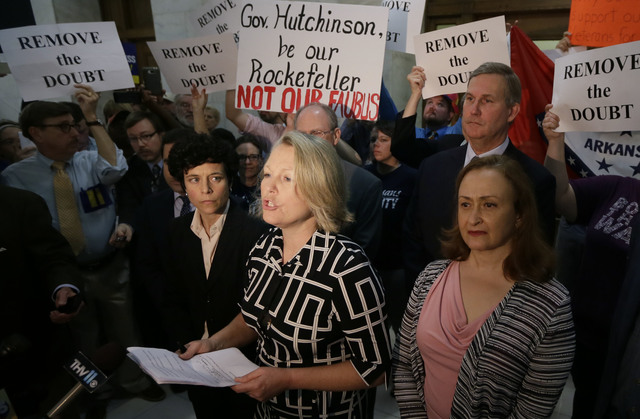INDIANAPOLIS — A day after Arkansas lawmakers defied criticism to pass a religious objections bill, the governor of Arkansas held off on signing the measure, saying it needed changes before he could make the proposal into law.
Gov. Asa Hutchinson said Wednesday that critics of the legislation included his own son, who signed a petition urging him to veto it.
Meanwhile in both Arkansas and Indiana, lawmakers weighed whether and how to revise the bills, which critics have blasted as unfair to gays. A look at the latest developments:
———
REVERSING COURSE
Only a day earlier, Hutchinson’s office said he would sign the measure. But after Indiana lawmakers were blasted for passing a similar bill, the Arkansas governor backed away from his state’s proposal.
He did not explain exactly what changes he sought, saying only that he wanted to ensure “that we communicate we’re not going to be a state that fails to recognize the diversity of our workplace, our economy and our future.”
———
MAKING CHANGES
Arkansas legislators face a short window to address Hutchinson’s concerns. The governor has five days to take action before the bill becomes law without his signature. Lawmakers had hoped to wrap up this year’s session by Thursday.
By Wednesday night, the Senate had approved a new version of the bill that now heads to the House. The revised proposal would address only actions by the government, not by businesses or individuals.
In Indiana, Republican legislative leaders met Wednesday with Pence as they worked to clarify Indiana’s law. A draft of the proposed language obtained by The Indianapolis Star reported that it would specify that the law cannot be used as a legal defense for refusing to provide services, goods or accommodations based on a person’s sexual orientation.
A deal had not been reached by Wednesday night, although legislative leaders indicated they hope to have language ready for possible votes Thursday.
———
PRESSURE FROM BUSINESS
Hutchinson also faced pressure from the state’s top employers, including Wal-Mart, which has asked for the bill to be vetoed. Other opponents included Little Rock’s mayor, the city’s Chamber of Commerce and Arkansas-based data-services company Acxiom.
Other big names in businesses, including Apple, Gap and Levi Strauss, have also spoken out against the religious objections measures.
Experts say companies are increasingly concerned about any laws that could alienate customers, limit employers’ ability to attract and retain talent and possibly hurt state or local economies.
Arkansas-based Wal-Mart Stores Inc. is particularly influential because it is the world’s largest retailer and the nation’s largest private employer.
———
WHAT THE INDIANA LAW SAYS
The Indiana law, which takes effect July 1, does not specifically mention gays and lesbians, but opponents say it is designed to protect businesses and individuals who do not want to serve gays and lesbians, such as florists or caterers who might be hired for a same-sex wedding.
The law prohibits state laws that “substantially burden” a person’s ability to follow his or her religious beliefs unless the government can show that it has a compelling interest and that the action is the least restrictive means of achieving it. The definition of “person” includes religious institutions, businesses and associations.
Critics say that language is broader than a 1993 federal law signed by then-President Bill Clinton that Pence says it’s based on.
Indiana and 19 other states have such laws on the books.
———
Associated Press writers Andrew DeMillo in Little Rock, Arkansas, and Tom Davies in Indianapolis contributed to this report.



